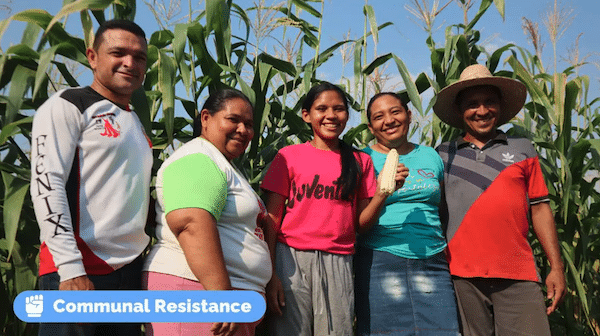Located on the outskirts of Biruaca, in Apure state, Nacidos para Vencer con Chávez [Born to Triumph with Chávez] is a women-led commune in a rural context that has a long history of patriarchal oppression. This fledgling commune seized upon Chávez’s idea as a way forward in difficult times, attempting to build community and increase production, while connecting with other communes through the Communard Union.
A COMMUNE RUN BY WOMEN
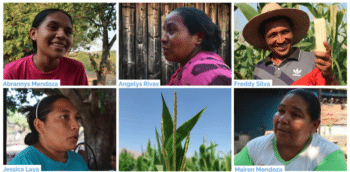 Abrannys Mendoza: Around 2015, spokespeople from fifteen communal councils here began to meet with a view to forming a commune: we wanted to carry out Chávez’s project. Two communes came out of those meetings: Los Herederos de Chávez and ours. Our commune is called Nacidos Para Vencer con Chávez. It was finally registered in February 2017, bringing together seven communal councils and a population of more than 2500 people.
Abrannys Mendoza: Around 2015, spokespeople from fifteen communal councils here began to meet with a view to forming a commune: we wanted to carry out Chávez’s project. Two communes came out of those meetings: Los Herederos de Chávez and ours. Our commune is called Nacidos Para Vencer con Chávez. It was finally registered in February 2017, bringing together seven communal councils and a population of more than 2500 people.
Ours has been a long struggle, but it’s been worth it. Now we have a close-knit organization that generates spaces of participatory decision-making and promotes production.
Mairen Mendoza: The commune contains about 14 thousand hectares of productive land, with relatively large extensions devoted to raising double-purpose cattle [dairy and meat], while the campesinos in the territory also grow cereals, topocho [small plantain], legumes, tubers, sugar cane, cocoa, onoto [a natural food colorant], and turmeric.
Jessica Laya: A commune will grow and become hegemonic in a region if it offers tangible solutions to the people. That is why in May 2017, shortly after our commune was registered, we began to work with the national “Plan de Siembra” [government-run initiative to promote agricultural production] to sow more than 200 hectares of corn.
Mairen Mendoza: Building a commune is about having a tangible project, but it is also about having our own mística [symbolic practices]. That’s why we organize communal sancochos[collective soup meals] to foster solidarity and sisterhood among the communards; one person brings the root vegetables, another brings the aliño [onion, pepper, etc.], and yet another brings the meat… After cooking together, we eat the hearty sancocho while we talk about our problems and our hopes.
This is a women-run commune. Birthdays and holidays are very important for us. I think there’s no better way of building a commune than sharing!
Abrannys Mendoza: It used to be that when people came over to a household in the plains region, the women would be sent to the kitchen to cook for the men. The fiesta was important, but we were locked up!
This all changed with the Bolivarian Revolution: we are no longer just the mothers and the wives stuck in the kitchen. And not only did we come out of the kitchen, we are now leaders in our communes and in the Socialist party [PSUV].
Of course, there is still much to do to achieve full equality: although women have been empowered, we are still the ones who care for the home. I long for the moment that men and women will go 50-50 on domestic chores.
AGRICULTURAL PRODUCTION IN TIMES OF CRISIS
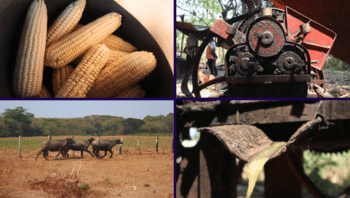 Mairen Mendoza: We recently purchased a four-acre tract of land for the communal project. However, in our territory most of the land is in the hands of small campesinos and mid-sized farmers. Even so, we all work together with a collective goal: increasing production and generating better living conditions for the community.
Mairen Mendoza: We recently purchased a four-acre tract of land for the communal project. However, in our territory most of the land is in the hands of small campesinos and mid-sized farmers. Even so, we all work together with a collective goal: increasing production and generating better living conditions for the community.
Perhaps the most interesting exercise in collaborative production and planning was the 2017 “Plan de Siembra,” when we received the inputs to plant 220 hectares of corn. That year we worked like there was no tomorrow!
The crop was excellent: 174 of the 220 hectares yielded about 4500 kilos per hectare.
It was a great year for the commune, because it taught us that we can produce more if we collaborate. However, 2017 was hard for us too: the harvest happened during the worst hyperinflationary period. That meant that by the time we got paid the money had vanished.
The situation took us to the brink of bankruptcy. That’s why we say that 2017 was both our best year and our worst year.
Since then, we have faced significant obstacles in corn production: funding is limited due to the blockade, and we often have to turn to the private sector to rent the machinery needed for sowing and harvesting. However, we aren’t about to give up: we know that the commune is the way forward!
COLLECTIVE SOLUTIONS
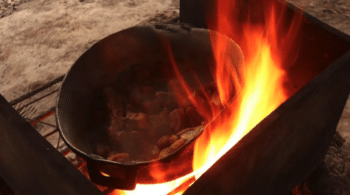
Sancocho (Photo: Rome Arrieche)
Mairen Mendoza: We are looking for alternatives in the midst of this crisis induced by the blockade. One of the most important initiatives is our communal “seed bank,” which aims to break dependency on the government and the capitalist market. About a year ago, twenty-five campesinos including myself joined hands to initiate a seed corn project.
Freddy Silva: The seed corn project takes about one hectare of my property. There we hope to produce high-quality corn seeds to plant 150 hectares in the commune.
The seed variety that we are producing is the “Maquina” white corn strain. The seed is robust and resistant to flooding, which is common here in the winter. It is also resistant to pests and it requires less fertilizer.
Mairen Mendoza: The seed corn project will give us autonomy and security. Seed packages often arrive late due to administrative and bureaucratic hurdles. Now, we will be able to sow in May and will need less fertilizer, because the ground will be ready for the seed.
Angelys Rivas: Legume production is key in our commune. This year we produced 210 tons of beans. Now, as everyone knows, intermediaries are the bane of the campesino, because they pay pennies to the dollar for our production.
That’s why we began to look for alternatives to lower costs on our end. With that goal in mind, we made an artisanal dehulling machine: the basis is an oil drum with motorcycle chains inside. The motor can run both on fuel and electricity. This is good because we often have blackouts.
We are proud of our dehulling machine: it is very efficient and can process 2000 kilos per day.
We also have a trapiche [artisanal sugar mill] that we use to convert sugarcane into melcocha[sugar candy] and panela. While these means of production are located on our property, they are both there to serve the community.
Mairen Mendoza: Nacidos Para Vencer con Chávez and six neighboring communes [Los Herederos de Chávez, Los Hijos de Chávez, Los Guerreros de la Patria, Las Colonias del Viento, Hermandad Moritense, and La Revolución en Progreso] are part of a Communal Economic Circuit that produces meat, cheese, corn, and legumes. It’s wonderful that we are increasing our productive capacity hand in hand with other communes.
Together with these other organizations, we are working to build a social property enterprise that we are calling “Los Soberanos.” Los Soberanos will be a bean-packaging plant that will help us put our production in the communal market, while avoiding intermediaries.
We just purchased a four-hectare tract of land that will become the site of the packaging plant. It was acquired with funds from the Consejo Federal de Gobierno [institution that finances communes] by way of the National Popular Consultation [May 2024].
Now we have to work hard to get the resources to build the plant there.
THE BLOCKADE
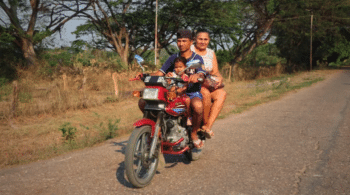
Fuel is difficult to come by at the Nacidos para Vencer con Chávez Commune. (Photo: Rome Arrieche)
Mairen Mendoza: When the blockade first hit us, production in the commune dropped dramatically.
The unilateral coercive measures, however, also brought us closer to the land: many people went back to their conucos [small subsistence plots ], where they now grow topocho, yuca, and other crops that satisfy household needs. This means there is greater diversification in the territory: we now grow 20 different crops, while cheese production is also increasing.
Of course, this didn’t happen overnight. We didn’t go hungry, but we lost many pounds over those years.
In addition to the conuco, one of the keys to addressing food needs in the commune is our “Casa de Alimentación” [Soup Kitchen], which opened its doors in 2018 and feeds more than 200 people.
We get some staples from the government, including cornmeal, rice, and pasta. We keep part of that for the Casa de Alimentación and exchange another part with local producers, who may give us some root vegetables or maybe a baba [small crocodile] they just hunted.
Angelys Rivas: Gasoline and diesel shortages became a problem a few years ago, and this has implications for production. Farm machinery runs on diesel; bringing inputs into the commune requires fuel; and getting our production to market requires gasoline. Fuel shortages are a huge problem for campesinos.
Fuel shortages also have implications when it comes to health. This is a rural commune, so when someone is sick or about to give birth, getting them to the hospital in San Fernando, which is some 25 kilometers away, becomes an ordeal.
Additionally, we have seen access to medications reduced significantly. That’s why I say that the blockade is not only illegal, it’s also criminal. How many people have died since it began?
Jessica Laya: Education has also been affected by the blockade. The deterioration of school infrastructures makes teaching and learning harder. In some schools, children don’t have chairs or desks, so they sit on the floor, and there is no electricity in some classrooms. Additionally, getting the kids to school has also become difficult due to fuel shortages, so schools are on a three-day-per-week schedule.
Nonetheless, we keep the schools open. We are committed to our children and won’t give up!
Mairen Mendoza: The blockade has been terrifying at times. The White House is set on toppling our government by any means, and it is no secret that their policies have set us back years in terms of our material well-being.
However, it is also true that the hardship has made us more resilient and more committed to the communal project. Chávez wasn’t wrong, the commune is the only way to build a better world. Do we face challenges and contradictions? We sure do, but the commune is the future, and that is as clear as the full moon [the luna llena or “full moon” is a reference to Chavez’s last speech].
CHÁVEZ, THE COMMUNE, AND THE COMMUNARD UNION
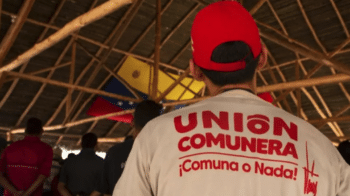
The Communard Union was founded on March 4, 2022. (Photo: Tatuy Tv)
Jessica Laya: The commune is Chávez’s legacy for Venezuela’s poor and working people. Commune-building isn’t easy, but I can’t imagine what we would be up to without it. The challenges would be even greater!
Mairen Mendoza: The commune is about bringing hope to the people, about organizing and producing what we need to live with dignity and in peace.… But communes cannot survive in isolation!
The Communard Union is a national organization that brings together dozens of communes. Together we fight to keep Chávez’s project alive. When we first heard about the Communard Union from Juan Fernández of the Pancha Vásquez Commune, we fell in love with the idea and joined it as fast as we could.
Of course, the Communard Union is a young organization, so there’s still much to do, but we put all our hopes in it. We cannot remain isolated!
Abrannys Mendoza: As a young woman, the Communard Union has been important for my political education. Its leadership courses and the workshops on communal feminism have helped me a great deal. I think that the Communard Union is the tool to build Bolivarian Socialism.
I remember that in one of the courses, a teacher told us that we still live in a capitalist country. Some of my comrades were surprised and said that that was not the case… but it is! That’s something that Comandante Chávez said, but younger generations have to be reminded of it.
To do away with injustices, we need the commune!

